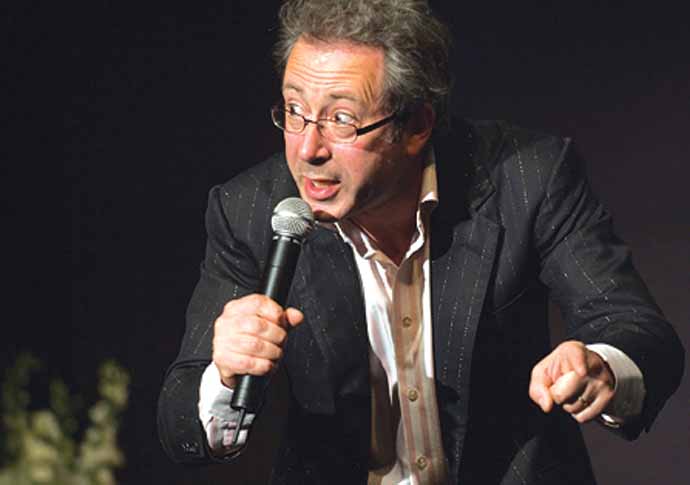Little bit of politics…
Stephen Griffin finds David Stubbs’ entertaining history of British comedy is a little stymied by its political agenda
Thursday, 7th March — By Stephen Griffin

Taking the mic: a shiny-suited Ben Elton in full flood [Ingo Hoehn]
WE may have lost the empire; we may no longer manufacture anything; we may have cast ourselves adrift from the rest of Europe, but, we tell ourselves, we’re superior to Johnny Foreigner because we have a unique quality: the Great British Sense of Humour. In fact, we prize that quality so highly we gifted a clown the premiership.
That’s how David Stubbs’ canter through the history of British (mainly television) comedy, Different Times, kicks off. And he has a point.
I’ve a friend – an otherwise intelligent cove – who shocked me by celebrating Bojo’s elevation. “What a refreshing change he is from the usual grey politicians we’re normally lumbered with,” he argued. “Isn’t it great to have a ‘character’ at No 10?”
Yes, I’d counter, that would be great if we were living in a 1950s Boulting brothers comedy, but this is real life. The last thing I’d welcome as I watched the Four Horsemen of the Apocalypse stride purposefully towards their stable is Terry-Thomas or Ian Carmichael at the helm.
Starting with Chaplin and Stan Laurel and ending with Bethany Black, Stubbs goes to great lengths to equate comedy with politics, a stance that will alienate and infuriate as many as it will attract. And it’s true to say that occasionally his agenda is distorted.
Personally I couldn’t care less whether Eric and Ernie were Tories and even mentioning a lack of diversity in Dad’s Army – a sitcom about the Home Guard in a small seaside town on the south coast during the Second World War – is frankly daft.
Stubbs’ framework is a simple one: he notes how the various decades informed the kind of comedy we enjoyed. The post-war 50s, he observes, was reflected in a downbeat monochrome Tony Hancock, the swinging 60s gave us the satire boom, the 70s saw the censor loosening the nation’s stays, and so on.
Talking of satire, I was interested to learn that Private Eye was almost called The Bladder, Richard Ingrams preferred title suggesting piss-taking for piss-taking’s sake. Apparently the idea was quashed by Willie Rushton, who had a relation suffering from a nasty bladder infection at the time. A pity. I rather like The Bladder. Perhaps that’s what he should have called The Oldie? Although Private Godfrey would probably have objected.
The title Different Times is an apposite one.
The bleeps in current screenings of Till Death Us Do Part, for example, aren’t there to cover up the occasional “bloody” but Alf Garnett’s now-shocking casual racism.
And scrolling through the more obscure channels, the other day I strayed across Up Pompeii! being broadcast at noon. Different times indeed: in 1970, Auntie considered Frankie Howerd’s Roman romp pretty strong stuff, putting it out after the Nine O’Clock News watershed.
Of course, when these period pieces are screened nowadays they’re invariably accompanied by the caveat: “This programme reflects the language and attitudes of the time, which may offend some viewers.” This warning, however, does not seem to apply to radio. The other day I happened across an episode of Hancock’s Half Hour entitled “The Male Suffragettes” in which the Lad Himself actively advocates domestic violence!
Stubbs quite rightly points out that recently comedy has become far more gentle, more kind. Bob Mortimer and Paul Whitehouse landing a trout has replaced Ade Edmondson landing a blow on Rik Mayall, Mackenzie Crook and his metal detector have seen off Basil Fawlty’s cuffing of Manuel. I can’t help but feel the BBC in particular got a tad twitchy after the Russell Brand/Jonathan Ross/Andrew Sachs debacle and has subsequently served us up a nice safe anodyne diet of Miranda Hart and Michael McIntyre.
This book provoked the ire of some reviewers, unhappy with Stubbs’ political stance, for being po-faced and omitting several greats.
That’s unfair, I think, for the former NME contributor certainly knows his stuff and he’s an excellent writer. It’s unfortunate that early in the book he mixes up Will Hay’s Ask A Policeman with Norman Wisdom’s On The Beat because a man who can write so eloquently and passionately about Marti Caine and Eleanor Bron deserves our attention.
Of course any book that covers such a huge topic is bound to contain omissions and prejudices, and Stubbs isn’t frightened to share his. He somewhat courageously confesses to disliking Spike Milligan. He quite correctly calls out Milligan for his fondness for blackface and points out that for all its inventiveness, The Goon Show has dated more than Ealing’s sub-Wildean confection, Kind Hearts and Coronets. Mind you, I was miffed by Stubbs’ assertion that anyone who didn’t collapse into paroxysms of uncontrolled mirth at the mere sight of Tommy Cooper should see a doctor. Well, it’s so hard getting an appointment.
I confess I have a blind spot too for Monty Python and – I’m sorry, Mr Stubbs – Fawlty Towers. But thankfully comedy is a broad church. With very different life experiences, we each find different things amusing. In that sense we’re all comedy experts and no one can really argue with our opinion on what is unfunny.
Apart from Mrs Brown’s Boys.
• Different Times: A History of British Comedy. By David Stubbs, Faber, £20